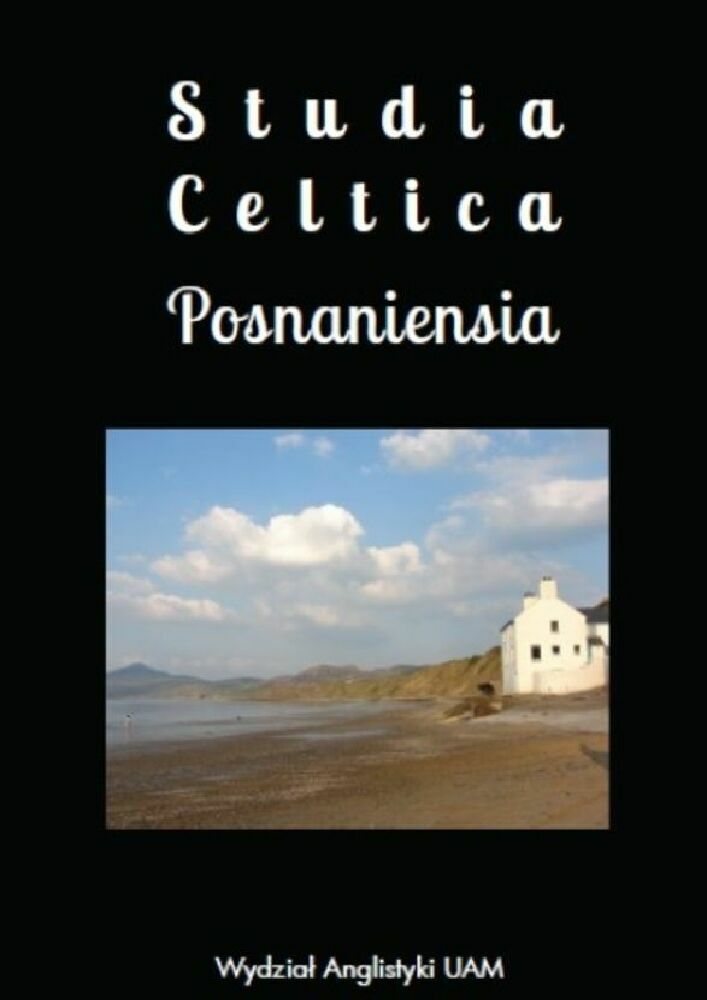Abstract
Most Humanities scholars probably have an intuitive sense of what is meant by a “ghost word” – it is a word that, in one way or another, exists as the result of someone’s unrecognized mistake. However, upon closer examination it becomes clear that the term is liable to be employed so broadly that important distinctions can be lost. For one thing, ghost words are often regarded simply as nuisances that should be deleted whenever they are detected. But in practice they often prove to be too useful simply to discard: this article presents some examples that have made their way into active usage among the Celts. In other cases the etymology may indeed be unnatural, but turns out to be the result of more than a hint of deliberate word-crafting right from the start. A taxonomy is here proposed that distinguishes true ghost words and dead words, on the one hand, from active items that may be described as poltergeist words and even Frankenstein words on the other.
References
Akademi Kernewek. 2019. Gerlyver Kernewek (FSS): Cornish Dictionary (SWF). https://www.cornishdictionary.org.uk/sites/default/files/SWF_dictionary_20190530_final.pdf
Bromwich, Rachel. (ed.). 1961. Trioedd Ynys Prydein: The Welsh triads. Cardiff: University of Wales Press.
Davies-Deacon, Merryn. “Names, varieties and ideologies in Revived Cornish”, Studia Celtica Posnaniensia 2: 79-93.
De Bhaldraithe, Tomás. 1959. English-Irish dictionary. Dublin: Oifig an tSoláthair.
De Bhaldraithe, Tomás. 1989. “Góstaí Gaeilge Edward Lhuyd agus a sliocht”, Éigse 23: 131-146.
Dick, Adolfus. (ed.). 1925. Martianus Capella. (2nd edition.) Stuttgart: Teubner.
Dinneen, Patrick S. 1927. Foclóir Gaedhilge agus Béarla: An Irish-English dictionary. Dublin: Irish Texts Society.
George, Dr Ken. 2009. An gerlyver meur: Cornish-English/English-Cornish dictionary. (2nd edition.) Kesva an Taves Kernewek.
Harvey, Anthony. 1990. “Retrieving the pronunciation of early Insular Celtic scribes: Towards a methodology”, Celtica 21: 178-190.
Harvey, Anthony. 2014. “Linguistic method in his literary madness? The word-coinings of Virgilius Maro Grammaticus”, in Elisa Roma and David Stifter (eds.), 79-104.
Harvey, Anthony. 2015. “Blood, dust and cucumbers: Constructing the world of Hisperic latinity”, in Emer Purcell, Paul McCotter, Julianne Nyhan and John Sheehan (eds.), 352-362.
Harvey, Anthony. 2016. “Varia, I: Hiberno-Latin quantotus, tantotus”, Ériu 66: 191-194.
Harvey, Anthony. 2018. “Frankenstein in the scriptorium: Bringing Latin to life in early medieval Ireland”, in M. Ó Flaithearta and L.B. Nooij (eds.), 105-120.
Harvey, Anthony and Jane Power. 2005. The non-Classical lexicon of Celtic latinity, vol. 1: Letters A-H. Turnhout: Brepols Publishers.
Harvey, Anthony and Angela Malthouse. 2015. The non-Classical lexicon of Celtic latinity, supplement: Letters A-H. http://journals.eecs.qub.ac.uk/dmlcs/supplmnt.pdf.
Kennedy, Benjamin Hall. (1962). The revised Latin primer. (New edition, ed. James Mountford). Harlow: Longman.
Kenney, James F. 1929. The sources for the early history of Ireland: Ecclesiastical. New York: Columbia University Press.
Lapidge, Michael and Richard Sharpe. 1985. A bibliography of Celtic-Latin literature 400-1200. Dublin: Royal Irish Academy.
Latham, R.E., D.R. Howlett and R.K. Ashdowne. 1975-2013. Dictionary of Medieval Latin from British sources. London & Oxford: The British Academy & Oxford University Press.
Lewin, Christopher. 2017. “Scholarship and language revival: Language ideologies in corpus development for Revived Manx”, Studia Celtica Posnaniensia 2: 95-116.
Lhuyd, Edward. 1707. Archaeologia Britannica, vol. 1: Glossography. Oxford: The Theater for the Author.
Lutz, Cora E. (ed.). 1939. Iohannis Scotti Annotationes in Marcianum. Cambridge, MA: Mediaeval Academy of America.
Mac Mathúna, Séamus. 1985. Immram Brain: Bran’s journey to the Land of the Women. Tübingen: Max Niemayer Verlag.
Moran, Pádraic. (ed.) 2019. De origine Scoticae linguae (O’Mulconry’s glossary). Turnhout: Brepols Publishers.
Nance, R. Morton. 1955. A Cornish-English dictionary. The Federation of Old Cornwall Societies.
Nance, R. Morton. 1963. A glossary of Cornish sea words. The Federation of Old Cornwall Societies.
Ó Corráin, Donnchadh. 2017. Clavis litterarum Hibernensium: Medieval Irish books and texts (c. 400 – c. 1600). 3 vols. Turnhout: Brepols Publishers.
Ó Flaithearta, Mícheál and Lars B. Nooij. (eds.). 2018. Code-switching in medieval Ireland and England. Bremen: Hempen Verlag.
Ó Nualláin, Brian (“Myles na gCopaleen”). 1986. An béal bocht. (5th edition.) Cork & Dublin: Preas Mercier.
Oxford English dictionary. http://www.oed.com.
Plummer, Carolus. (ed.). 1910. Vitae sanctorum Hiberniae. 2 vols. Oxford: Typographeum Clarendonianum.
Polara, G. (ed.). 1979. Virgilio Marone grammatico: Epitomi ed Epistole. Naples: Liguori editore.
Power, Patrick C. 1986. The poor mouth: Flann O’Brien. London: Grafton Books.
Purcell, Emer, Paul McCotter, Julianne Nyhan and John Sheehan. (eds.). 2015. Clerics, kings and vikings. Dublin: Four Courts Press.
Richter, Michael. (ed.). 1977-1978. “Giraldus Cambrensis and Llanthony Priory”, Studia Celtica 12-13: 118-132.
Roma, Elisa and David Stifter. (eds.). 2014. Linguistic and philological studies in early Irish. Lewiston, NY & Lampeter: The Edwin Mellon Press.
Shelley, Mary Wollstonecraft. 1831. Frankenstein. (3rd edition.) London: Colburn and Bentley.
Stephens, Meic. 1986. The Oxford companion to the literature of Wales. Oxford: Oxford University Press.
Stokes, Whitley. (ed.). 1860. Irish glosses: A mediaeval tract on Latin declension. Dublin: The Irish Archaeological and Celtic Society.
Stokes, Whitley. (ed.). 1890. Lives of saints from the Book of Lismore. Oxford: Clarendon Press.
Thomas, R.J., Gareth A. Bevan and Patrick J. Donovan. 1950-2002. Geiriadur Prifysgol Cymru: A dictionary of the Welsh language. Cardiff: Gwasg Prifysgol Cymru.
Welch, Robert. (ed.). 1996. The Oxford companion to Irish literature. Oxford: Clarendon Press.
License
Copyright (c) 2019 The Faculty of English, Adam Mickiewicz University

This work is licensed under a Creative Commons Attribution-NonCommercial-NoDerivatives 3.0 Unported License.
